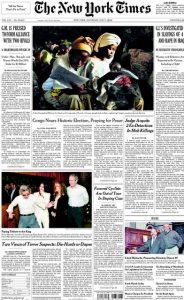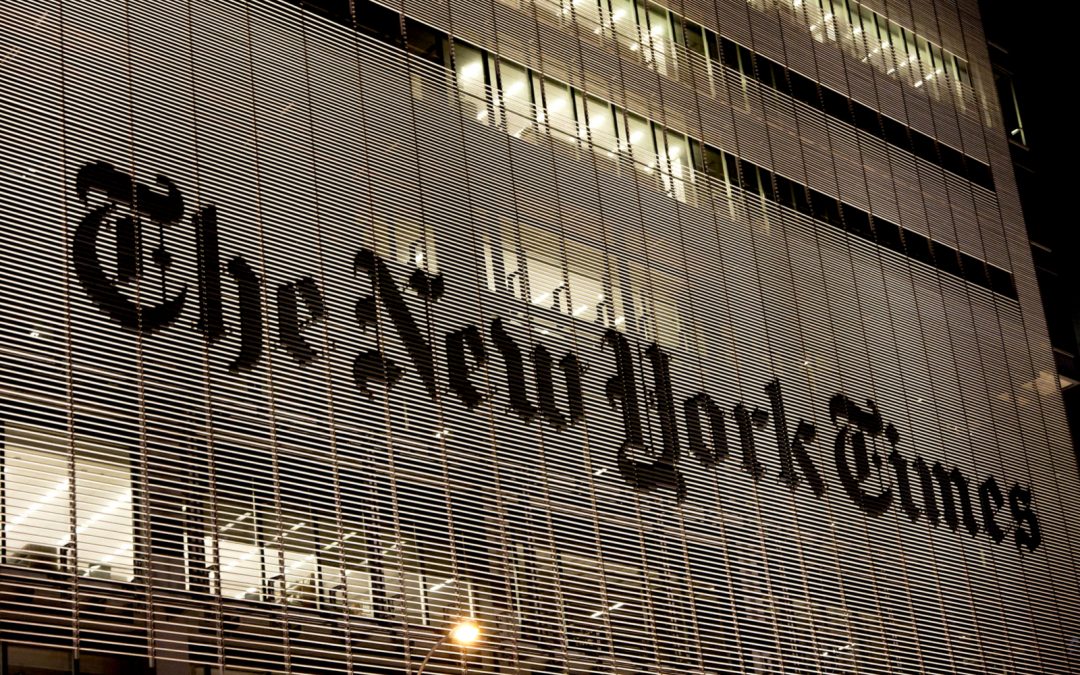Editorial credit: / Shutterstock.com
Attorney Nathan D. Clark, Esq. on the Front Page of The New York Times
Two Views of Terror Suspects: Die-Hards or Dupes
Syndication: By CHRISTOPHER DREW and ERIC LICHTBLAU
Published: July 1, 2006
 MIAMI, June 30 – The seven men who were arrested here last week on terror charges were shown Friday on undercover videotapes solemnly reciting oaths of loyalty to Al Qaeda, repeating the words that an F.B.I. informant had given them to say.
MIAMI, June 30 – The seven men who were arrested here last week on terror charges were shown Friday on undercover videotapes solemnly reciting oaths of loyalty to Al Qaeda, repeating the words that an F.B.I. informant had given them to say.
The tapes, played at a federal court hearing by prosecutors, did not provide any evidence that the men had the money or firepower to blow up the Sears Tower in Chicago and federal buildings in five cities, as they are accused of conspiring to do, or that they had any actual ties to Al Qaeda.
But during her presentation, the prosecutor, Jacqueline M. Arango, disclosed other new details of the case, among them that the group’s leader, Narseal Batiste, had asked the undercover informant for rockets and semiautomatic rifles.
Lawyers for some of the men said in interviews this week that their clients knew little about Mr. Batiste’s plans to attack the Sears Tower. Some of the lawyers criticized the new evidence presented Friday as a sign that the government had largely concocted other parts of the case and had lured the men into doing more than they would have on their own.
“It’s clearly a case of entrapment,” said Nathan Clark, the lawyer for one of the defendants, Rotschild Augustine. Mr. Clark said the taped oath was “induced by the government.”
The tapes, in fact, made clear the large role that the government informant had played in the case. In one tape, the informant recited what F.B.I. agents said was an authentic Qaeda oath, while the seven men sat on a sofa and chairs in a warehouse that the F.B.I. had wired with eavesdropping equipment. As the informant repeated the words for a second time, each defendant stood and stated his name before they all said in unison that they were committing themselves to the “path of jihad.”
But the parents of most of the defendants, including some who have been very critical of the case, appeared surprised by the evidence presented Friday, sitting quietly through the court hearing and refusing to comment afterward.
Over the last week, many critics of the Bush administration described the case as improbable and suggested that it was emblematic of other exaggerated threats that the F.B.I. had often focused on since the Sept. 11 terror attacks, especially inasmuch as federal officials said Mr. Batiste had no ability to carry out the proposed attacks.
But while the new information added to the portrait of Mr. Batiste as a bizarre and self-aggrandizing figure – he told an informant that he would like to smoke a cigarette with Osama bin Laden – it also suggested that he was determined and persistent. The new information indicated that his followers, mostly poor, young Haitian-Americans, were more involved in parts of the scheme than their families and community leaders had suspected.
The prosecutor said some of the men had strip-searched the undercover informant at a time when Mr. Batiste was worried about F.B.I. surveillance, and had also voted to take photographs of several government buildings in Miami that they thought Al Qaeda might want to attack.
Law enforcement officials said that after the men were arrested, at least two admitted some knowledge of the Sears Tower plot. The officials also said that there was ample evidence to bring all of the men into the conspiracy charges, and that after the Sept. 11 attacks, they had no choice but to be aggressive in disrupting any group that showed even the slightest interest in being involved in terrorism.
The Miami case is part of a broader strategy of pre-empting terrorist attacks in what Justice Department officials acknowledge is a significant shift in the way they go about investigating and prosecuting possible terrorism cases.
“We can’t afford to wait,” a senior Justice Department official said in an interview. The suspects in Miami “were of significant concern, and we’re not going to allow them to run into somebody who has the means to carry out what they were talking about.”
“You may never know what you prevented,” the official added, “but those may be our greatest successes.
The pre-emptive strategy has led to increased use of what amount to sting operations by the F.B.I. to use informants and undercover operatives in gathering evidence against people suspected of terrorist ambitions. The strategy has led to prosecutions and convictions in terrorism cases from San Diego and Houston to Newark and Albany, often involving concocted plots to sell fictitious arms or provide other support to Al Qaeda.
Justice Department officials point to a number of high-profile successes in the campaign, including the convictions of Zacarias Moussaoui, John Walker Lindh, a Muslim-American student in Northern Virginia named Abu Ali and a Virginia cleric named Ali al-Timimi and his followers, who prosecutors said sought to wage war against Americans overseas.
But there have been a smaller number of losses as well, including the collapse of the case against an alleged terrorist cell in Detroit after accusations of prosecutorial misconduct, and the acquittal in Idaho of a graduate student in computer programming on charges of using Web sites to aid terrorists.
“While our record shows many victories in recent years, we haven’t always been successful,” Deputy Attorney General Paul J. McNulty told reporters last week in assessing the overall strategy of the campaign against terrorism.
The Justice Department says it has brought 441 prosecutions in what it considers to be terrorism-related cases, with 261 convictions and 150 cases remaining.
Mr. Batiste, 32, who is married and has four children, grew up in Louisiana as the son of a Christian preacher and later worked as a FedEx driver in Chicago. He and his wife opened a stucco and masonry business here in 2004, and he rented a small salmon-colored warehouse last year in Liberty City, where he held Bible readings.
And while federal authorities described Mr. Batiste and the other defendants last week as “a radical Islamic group,” neighbors say his religious teachings came from the Moorish Science Temple of America, a group founded in Illinois in the early 1900’s that blends Christianity, Judaism and Islam with an emphasis on self-discipline through martial arts.
The group’s headquarters was a 750-square-foot former convenience store with an old sofa in the back and no running water. People who live near the building, which had no windows or air-conditioning, say they would sometimes see Mr. Batiste and a dozen or so other men there in the evenings, either inside with the doors open or practicing martial arts in the backyard.
Others say that while the group – which called itself the Seas of David – read the Koran at times, Mr. Batiste’s favorite text was Jesus’ Sermon on the Mount.
At first, relatives and lawyers said, the defendants were intrigued by Mr. Batiste’s religious teachings, which some of the men saw as an alternative to the drug-dealing streets in Liberty City, one of Miami’s poorest neighborhoods. But by this past April, the lawyers said, some defendants had grown suspicious of Mr. Batiste and had left the group after he seemed to become more focused on raising money than on his religious teachings.
According to the indictment, the criminal investigation began last October, after Mr. Batiste began expressing ominous goals. He told someone who was traveling to Yemen that he wanted to raise an army to overthrow the United States government and needed help, one document says, “in locating foreign Islamic extremists to fund his mission.”
After that person tipped the F.B.I., Ms. Arango, the prosecutor, said Friday, the bureau arranged for the undercover informant posing as a terrorist to begin a series of meetings with Mr. Batiste, which stretched from December through late May.
With the government’s recording tapes whirring, the indictment says, Mr. Batiste told the informant – who at some point identified himself as being with Al Qaeda – that he wanted to kick off his war with an attack on the Sears Tower. He also asked the informant to supply him with $50,000 in cash and all the equipment, from military boots to weapons, that he and his soldiers would need to “kill all the devils we can.”
And by mid-March, the informant had proposed – at a meeting with all seven defendants – bombing F.B.I. buildings in Miami and four other cities. Ms. Arango said that proposal was made just minutes after each of the men had taken the oath to Al Qaeda. Over the next three weeks, using camera equipment supplied by the government, Mr. Batiste and four of the others were involved in either taking photographs or videotapes of government buildings in Miami or delivering them to the informant.
Ms. Arango said the group split up last spring after a religious leader from Chicago had a dispute with Mr. Batiste and some of the other defendants sided with the Chicago man.
Federal officials say they also have other evidence, including statements given by some of the men shortly after they were arrested. At another hearing on Thursday, for instance, officials released a handwritten statement by one of Mr. Batiste’s young followers, in which he acknowledged taking the oath to Al Qaeda and being present when Mr. Batiste received a video camera from the undercover informant “to film target locations (Federal Buildings & Tower building) in Miami, FL and Chicago, IL.”
Christopher Drew reported from Miami for this article, and Eric Lichtblau from Washington. Reporting was contributed by Abby Goodnough and Andrea Zarate from Miami, David Johnston from Washington and Brenda Goodman from Atlanta.

